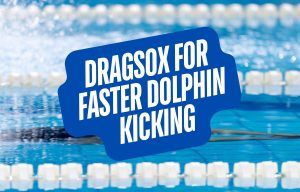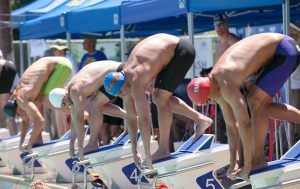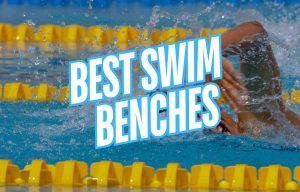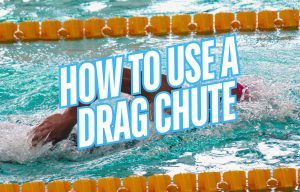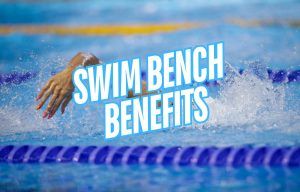Peak Performance: Elevate Your Game, Avoid Burnout, and Thrive with the New Science of Success is a best-selling book that—you guessed it—helps promotes peak performance.
The book is a compilation of tools and research that athletes (and especially swimmers) can use to improve their performances in training.
The spine of the book is that “stress + rest = growth.”
Seems super obvious, but through anecdotes of high-performers, research papers, and the authors’ own experience coaching high-performance athletes, they show how resting properly is ultimately what is going to allow you to stress yourself at a high level.
Here are some of my favorite takeaways from Peak Performance that swimmers can take with them to the pool to karate kick their training and PB’s.
Where to Buy — Peak Performance
Pre-race anxiety is neutral. It’s how you react to it that matters.
It’s a familiar scene: You are standing behind the blocks, arms swinging at 332mph, legs pumping, and you have that constant and sudden urge to pee. Your stomach churns, palms sweaty, and the performance anxiety and adrenaline are surging through you.
Some swimmers will frame these feelings as bad and will try to suppress them. While good-intentioned, this usually makes things even worse. When we can’t temper the nerves, we feel out of control, we rush through our process, and tense up.
Next stop, Choke-town.
Other swimmers will sit in the nerves and anxiety, understanding that this is simply excitement. These swimmers are able to rationalize what they are feeling as excitement, using the energy as fuel to maximize their performance in the water.
(The difference between literally saying “I am excited!” instead of “I am anxious!” before a high-pressure moment is hilariously staggering.)
- “How you view something fundamentally changes how your body responds to it.”
- “Challenge yourself to view stress productively, and even to welcome it. You’ll not only perform better, you’ll also improve your health.”
Next time you are getting behind the blocks, or preparing for a super challenging main-set, remind yourself that the nerves and anxiety mean something special is about to happen.
Focus like a champion.
How often do you catch your focus wandering during your swim workouts? Can’t really fault you for having it happen—swimming around a black line for hours on end like a goldfish can get monotonous.
To entertain ourselves, we let our focus and concentration wander. We think about the hilarious Snap we got earlier that afternoon. The homework assignments we are procrastinating on. Obsessing over the text we got from our crush.
- “Across the board, when great performers are doing serious work their bodies and minds are 100 percent there. They are fully engaged in the moment.”
- “Define a purpose and concrete objectives for each working session… Focus and concentrate deeply, even if doing so isn’t always enjoyable.”
Elite swimmers, when they are in the pool, are fully dialed in on what they are doing:
Caeleb Dressel, sprint god, focuses relentlessly on his technique and body position when in the water (especially when he is having a bad workout).
12-time Olympic medalist Natalie Coughlin credited her ability to focus deeply while at practice—often trying to mimic the same way she wanted to feel in competition while training.
While you are in the water, focus deeply on what you are doing to maximize the time spent at practice.
Champions don’t just work hard, they recover hard.
How seriously do you take your recovery? How much effort do you spend on eating well and getting as much sleep as you can between workouts? Do you have a recovery routine as part of your training?
Ultimately, how hard you are able to work hard is a reflection of how well you are recovering and resting between sessions.
Underrecovery is the parking brake on your swimming.
- “Elite athletes were able to transition from stress to rest much faster than their more novice peers. Perhaps the adage that hard work separates the best from the rest only explains part of the picture. The best rest harder, too.”
- “The best athletes in the world all prioritize sleep just as much as they prioritize their hardest training sessions and their most important competitions.”
- “Studies show that vigor and performance increase following a rest day, and the more someone actually rests on the weekend, the more effort they expend during the week.”
Frame recovery as an active part of your training.
Rest and recovery can be difficult to pitch to athletes who are under the impression that they must grind and hustle and push 24/7, 365 days a year.
This kind of constant pushing, without intermittent breaks to refuel and rejuvenate, is the “easier” path in today’s day and age.
It seems to take more courage and guts to rest.
- “In a society that glorifies grinding, short-term gains and pushing to extremes, it takes guts to rest… We should all reframe rest. Rest isn’t lazily slothing around; it’s an active process in which physical and psychological growth occurs. To reap the benefits of stress, you need to rest.”
- “The irony is that resting hard often takes more guts than working hard.”
One coach that the authors talked to, who works with world-class triathletes, found that his athletes were more likely to take rest seriously when it was framed as “something that supports growth and adaptation… This simple shift in mindset enables [him] to do what so few coaches can: convince his athletes to rest.”
Mindfulness training can help you suffer like champion.
Mindfulness training helps you better manage the pain and discomfort that comes with training your butt off in the water and in the gym.
When you are in the midst of a threshold set, or pushing to maximum reps, we get wrapped up in those familiar thoughts: Ouch, this frigging hurts so much or This is going to be a really long workout.
These types of emotional statements increase our heart rate and tension, while “both enjoyment and performance diminish.”
Regularly practicing mindfulness helps you to “suffer” through the pain and discomfort with more perspective.
- “In the middle of a challenge, mindfulness helps you remain calm and collected. It lets you devote all your physical and psychological energy to completing the task at hand, not to worrying about it. After a challenge, mindfulness lets you choose to turn off stress and transition to a more restful state.”
Not all rest is equal.
Typically, when we need to take a break from a hard homework assignment, we dive head-first into social media. Or when we have a big workout, we “rest” by staying out late and eating like a donkey.
How you choose to recover matters. Going for walks helps. Socializing with friends helps. Sleeping more helps. How well you rest depends on the activities you rest with.
- “Browsing social media, for example, isn’t nearly as effective as taking a walk.”
- “We are not suggesting that you haphazardly take off-days and extended vacations. Rather… you strategically inset longer periods of rest to follow longer periods of stress.”
Routines are your ally.
Elite swimmers use routines to increase the likelihood of success on race day.
They use visualization routines to help buffer them against the stress and pressure of competition. They have pre-race routines to help them get a building sense of confidence as their races near. They use mental warm-ups to get them in the right frame of mind before practice.
Success in the water is very rarely an accident. Routines are at the root of what makes success more predictable for high achievers.
Instead of hoping their A-game will be there for them, or that they will “feel like it,” or that things will magically go their way, elites cut down on uncertainty by using pre-workout/competition routines that put them in a place where they are most likely to create successful outcomes.
- Elites “actively create the specific conditions that will elicit their personal best, priming themselves for performance… these priming strategies are effective because of their specific components and consistent repetition.”
- “For elite athletes, a physical warmup does more than stimulate bloodflow and prime the muscles for performance. It also helps to foster a clear and relaxed mind.”
Ultimately, you need to be willing to invest the time and energy into build routines that work for you. There is in one-size-fits-all routine.
- “It’s up to you to determine the ideal state of body and mind for the demands of your event, and to figure out the best way to put yourself in, or very close to, that state from the outset.”
 Where to Buy — Peak Performance
Where to Buy — Peak Performance
More Stuff Like This:
6 Things Swimmers Can Learn from Michael Jordan. The greatest basketball player of all time has some valuable lessons for swimmers in achieving greatness.
6 Things Swimmers Can Takeaway from “The Mindful Athlete” by George Mumford. Mindfulness training is one of the best ways that swimmers can sharpen their mindset, reduce pressure, get in the zone, and have more fun while toiling away in the pool.

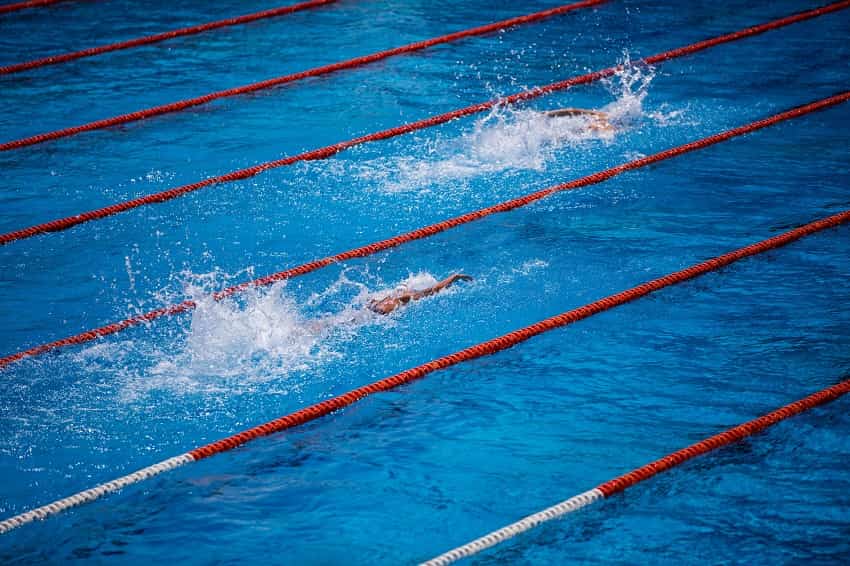
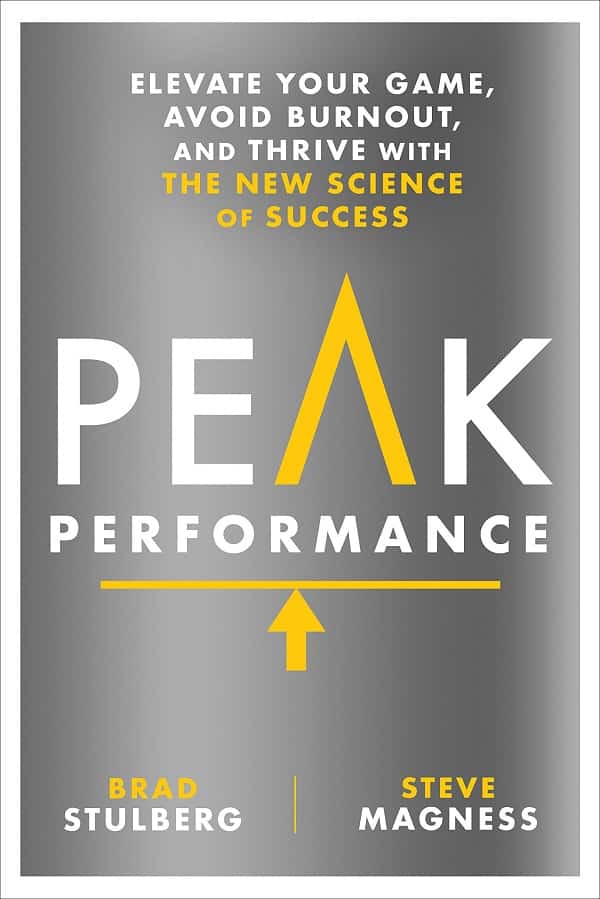
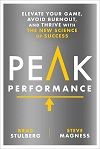 Where to Buy — Peak Performance
Where to Buy — Peak Performance



